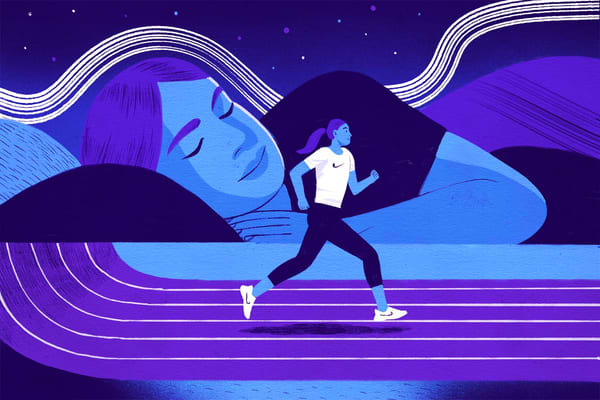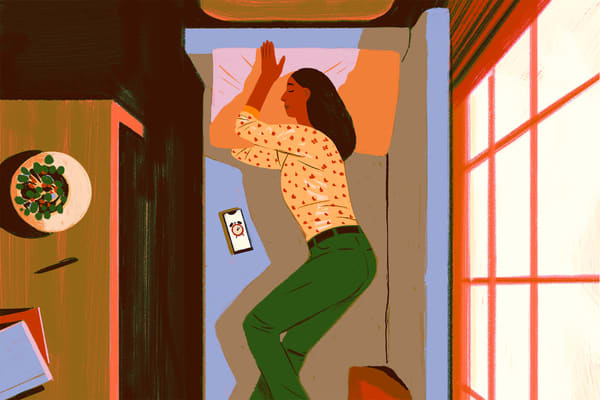Can't Sleep? Here's What Experts Say To Do
Health & Wellness
Try these tips to quickly drift off and secure more precious hours of shut-eye.

How frustrating is it to climb into bed, hoping to get some much-needed rest, only to be kept awake by disruptive thoughts?
According to research, between 10 to 15 percent of adults globally can be classified as having short-term insomnia—meaning trouble sleeping that lasts for days or weeks at a time. More than that, up to one-third of the world's population report generally feeling dissatisfied with their sleep.
If you find that drifting off is challenging at times, know that you're not alone. Luckily, experts say there are a few things you can do to invite sleep a bit faster.
Top Causes of Insomnia
"The most common reasons people have trouble falling asleep are anxiety, stress and just not being able to turn down their busy brains", said Shelby Harris, Psy D, who specialises in behavioural sleep medicine.
Another big contributor to sleep troubles? Poor sleep hygiene. Sleep-promoting behaviours and habits are often referred to as "sleep hygiene", said Matthew Goldenberg, DO, a psychiatrist who treats patients with insomnia. According to the Centers for Disease Control and Prevention, other aspects of sleep hygiene include:
- Setting a consistent sleep schedule
- Creating a dark, quiet and relaxing bedroom environment
- Avoiding large meals, caffeine and alcohol before bedtime
- Powering down screens (TV, phone, tablet, etc.) before bedtime
- Engaging in physical activity during the day
A lot of sleep problems come down to sleep hygiene, Goldenberg added. "People will often not recognise why they have problems sleeping, but poor sleep hygiene will often be the underlying cause", he said. Luckily, most of these are within your control to change.
What To Do If You Can't Sleep
Having trouble falling asleep? Here's what the experts recommend you do to drift off to sleep sooner rather than later.
Step 1: Don't Force It
"Thinking too much about sleep makes us more tense and, in turn, makes sleep harder to come by", Harris said. "If you can't sleep for a while and are getting frustrated, just get up and do something quiet, calm and relaxing to pass the time until you're actually sleepy".
"The longer you lie and stare at the clock, the more it will feed into your frustration", Goldenberg said. He suggested that after 30 minutes of sleeplessness, you get up, go into another room, and journal. "Write down some of the stuff you're thinking about, ideally on paper", he said. Note: You can also utilise this time to do something soothing such as reading (with a small, not-too-bright light), knitting, or do any other relaxing activity you enjoy that doesn't involve a screen.
"Just pass the time, and don't force sleepiness", Harris said. When you start to feel sleepy again, try to go to bed once more.
Step 2: Establish a Consistent Schedule
"Consistency with a bed and wake time is really important", Harris said. According to a research review in a 2020 issue of the Applied Physiology, Nutrition, and Metabolism, regular sleep patterns with consistent bedtimes and wake times are associated with positive health outcomes, such as lower cardiometabolic health and sedentary behaviour.
This is especially important when it comes to your wake-up call. "The more you're consistent with your wake time, the more consistent your bedtime will become", Harris said.
Sticking to a set wake-up time can be difficult—especially if you're having trouble falling asleep—but eventually, you'll feel sleepier earlier and establish a consistent schedule.
Step 3: Cut Out Afternoon Caffeine
Caffeine is a stimulant that keeps you awake when you're trying to push through a long day, but it can also sabotage your sleep if you drink it too late in the day. What counts as "too late" varies from person to person, Goldenberg explained, adding that some people can drink coffee just before sleep while others can't have it up to eight hours before bedtime.
"If you're really having trouble sleeping, try cutting yourself off at noon and see if that helps", he said (assuming you're someone who doesn't work the night shift). "You can always move it half an hour closer to bed per day and see how it affects you".
(Related: The Benefits of Drinking Coffee Before and After Working Out)
Step 4: Finish Eating and Exercising Early
Goldenberg also recommended not eating a big meal within two hours of bedtime.
"It can wake some people up", he said. "You may feel tired right after, like you're in a food coma, but then it wakes you up".
On the flipside, going to bed hungry can make it harder to fall asleep—it's difficult to lie there and get comfortable if you've got hunger pangs. Aiming to finish eating two to three hours before bed is a good rule of thumb, Goldenberg said.
He also recommended against doing any strenuous exercise right before bed. "Again, give it a good two to three hours before bed", he said.
Research suggests you can cut it closer if your workout is more moderate in intensity: according to a 2020 study published in the European Journal of Sport Science, moderate-intensity aerobic or resistance exercise that ends 90 minutes before bedtime shouldn't interfere with your ability to fall asleep.
Step 5: Create a Bedtime Routine
That time before bed when you allow yourself time to read a book, relax, do your skincare routine, and settle in at the end of a long day, should not be rushed or skipped.
"Work to protect an hour for winding down with no work before bed", Harris said. And aim for those last 20–30 minutes before bed (at least) to be screen-free, she added. This will all help your body and brain calm down and recognise that bedtime is right around the corner.
Step 6: Pre-schedule Your "Worrying Time"
If you can't sleep because of anxiety, Goldenberg suggested setting aside some dedicated "worrying time" well before bed.
"During this time, journal and write down what you accomplished today and what you have to do tomorrow. Write down any worrying thoughts so they are already out of your head before you go to bed", he said.
When you eventually climb into bed, if any worries pop into your brain, you can remind yourself that you already wrote those things down and don't need to address them until after you wake up. This can help stop you from running through your to-do lists over and over again while you're trying to drift off to sleep, Goldenberg said.
Step 7: Start Meditating
"A meditation practice for even five minutes a day can greatly help", Harris said. This doesn't mean you have to save your meditation for bedtime—though you may find it supportive to include it in your wind-down routine.
(Related: The Benefits of Meditation and Mindful Movement, According to Researchers)
Goldenberg noted that mindfulness can be a helpful tool to turn to when you're lying in bed and struggling to fall asleep, but you have to practise it regularly to be able to tap into it on demand. "It's one of those things you have to practise so you can put it into place when you really need it", he said.
If you don't know where to start, he recommended trying a meditation app such as Headspace. This app offers guided meditations that can help you learn how to do it and what style of meditation suits you best. That way, when your mind is reeling at night, you can turn to this skill to help rein in those thoughts and find a sense of calm.
Words by Amy Marturana Winderl





